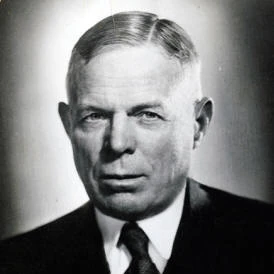Presidential Address
The Emergence of the First Social Order in the United States
In Memoriam
From the American Historical Review 45:3 (April 1940)
William E. Dodd (October 21, 1869–February 9, 1940). After battling heroically for more than a year against a paralysis of the throat, William E. Dodd died of pneumonia on February 9 at his country home, Round Hill, Virginia, at the age of seventy. Born in Clayton, North Carolina, Dodd took his bachelor’s and master’s degrees at the Virginia Polytechnic Institute and received his doctor’s degree in history at the University of Leipzig in 1900. From 1900 to 1908 he was professor of history at Randolph-Macon Woman’s College, whence he was called to be professor of American history (and eventually head of the department) at the University of Chicago. Professor Dodd’s teaching career of over thirty years came to a close in 1933, when President Roosevelt appointed him ambassador to Berlin. In this most difficult of American diplomatic posts Ambassador Dodd showed great determination in his protests to Foreign Minister von Neurath and to Hitler himself against Nazi attacks on American citizens in Germany, and in his speeches he did not hesitate to convey indirectly a condemnation of the Nazi regime, which violated the liberal Jeffersonian principles on which he had been nourished. Under the circumstances, it is not to be wondered at that when he left his post, at the close of 1937, his departure was not graced by the usual official compliments or even mentioned in the strictly controlled Nazi press. Back in the United States, he continued his strictures on the Hitler regime, drawing a protest from the German embassy at Washington to which our State Department replied that as a private citizen Mr. Dodd was free to express his opinions in a democratic country. Professor Dodd’s contributions to American historiography were notable. Jefferson, Lee, and Wilson were his heroes. His life of Jefferson, written in German, bore the title Jefferson’s Rückkehr zur Politik. In 1920 he published Woodrow Wilson and his Work, perhaps the best single volume biography of the great war president; and, with Ray Stannard Baker, he edited the Public Papers of Woodrow Wilson. His The Colton Kingdom: A Chronicle of the Old South (1919) is the gem of the Chronicles of America series. His writings also include Jefferson Davis, Statesmen of the Old South, and Lincoln or Lee. Straightforwardness was a distinguishing characteristic of Professor Dodd’s writing. Throughout the years of his teaching at Chicago he remained a spokesman for his native South. He evidently set Lee above Lincoln in his little volume comparing the two men, and in his biography of Wilson (written at a moment when the great idealist was experiencing his bitterest frustration) there are passages of undue asperity against the commercialized and obstructive policies of the northeastern states. For all that, his work is solid and honest, and his passing “leaves an empty space against the sky” for his many friends and colleagues in American history.
Bibliography
The life of Nathaniel Macon, by William E. Dodd. Raleigh, N.C.: Edwards & Broughton, Printers, 1903; Reprint, New York: B. Franklin, 1970.
Jefferson Davis, by William E. Dodd. Philadelphia: G.W. Jacobs, 1907; Reprint, introduction to the Bison Books edition by Steven E. Woodworth. Lincoln, Neb.: University of Nebraska Press, 1997.
Robert J. Walker, imperialist, by William Edward Dodd. Chicago: Chicago Literary Club, 1914.
Expansion and conflict, by William E. Dodd. 2d, rev. ed. Boston: Houghton Mifflin, pref. 1919, 1915.
Woodrow Wilson and his work, by William E. Dodd. Garden City, N.Y.: Doubleday, Page, 1920.
The public papers of Woodrow Wilson. Edited by Ray Stannard Baker and William E. Dodd. Authorized ed. 6 vols. New York: Harper, 1925-1927.
The cotton kingdom; a chronicle of the Old South, by William E. Dodd. New Haven: Yale University Press, 1921; Reprint, Toronto: Glasgow, Brook; New York: United States Publishers Association, 1978.
The spirit of ’76 and other essays, by Carl Becker, J. M. Clark, William E. Dodd. Washington: Robert Brookings graduate school of economics and government, 1927.
The old South; struggles for democracy, by William E. Dodd. New York: Macmillan, 1937
The Nazi primer; official handbook for schooling the Hitler youth, translated from the original German with a preface by Harwood L. Childs with a commentary by William E. Dodd. New York, London: Harper & Brothers, 1938.
Ambassador Dodd’s diary, 1933-1938; edited by William E. Dodd, jr. and Martha Dodd. With an introduction by Charles A. Beard. London: V. Gollancz, 1941.
